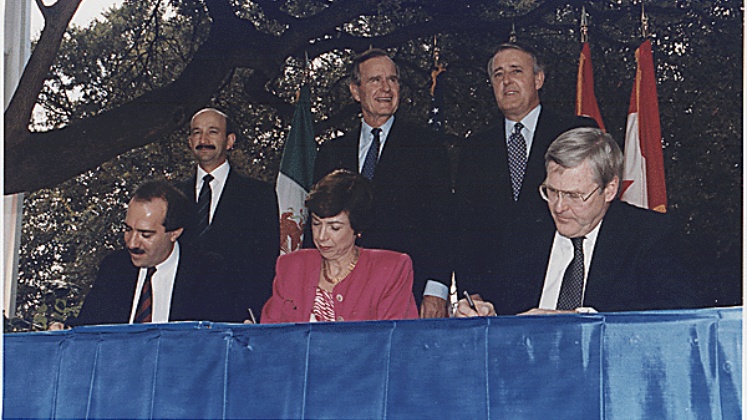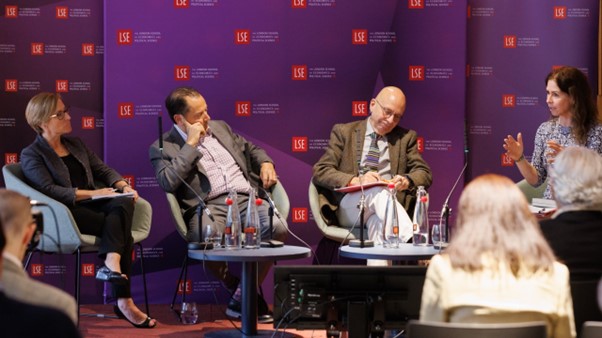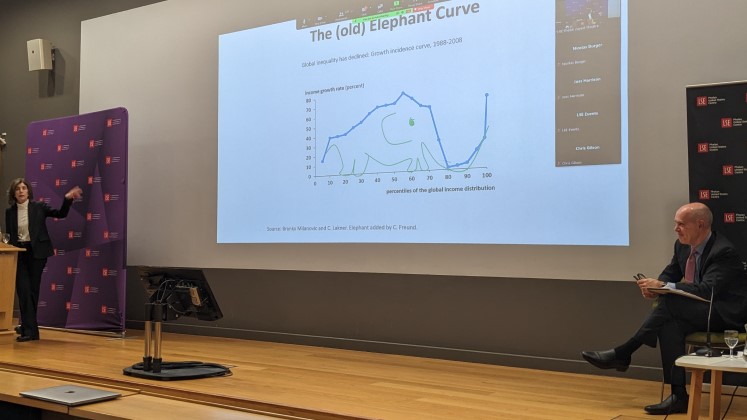 On Saturday 21 October, the Phelan US Centre hosted the conference, The Future of Capitalism in an Age of Insecurity, which brought together leading scholars and analysts to examine the effects of geopolitical turmoil, democratic discontent, anti-globalism, and technological change on capitalist economies. The third conference panel, Global governance in an era of anti-globalism, featured Professor G. John Ikenberry (Princeton University), Professor David Luke (Firoz Lalji Institute for Africa, LSE), and Professor Nita Rudra (Georgetown University). Grace Lundell gives an overview of the panel and the Q&A segment.
On Saturday 21 October, the Phelan US Centre hosted the conference, The Future of Capitalism in an Age of Insecurity, which brought together leading scholars and analysts to examine the effects of geopolitical turmoil, democratic discontent, anti-globalism, and technological change on capitalist economies. The third conference panel, Global governance in an era of anti-globalism, featured Professor G. John Ikenberry (Princeton University), Professor David Luke (Firoz Lalji Institute for Africa, LSE), and Professor Nita Rudra (Georgetown University). Grace Lundell gives an overview of the panel and the Q&A segment.
We live in an era of shattering challenges for global governance. On October 21st, as part of the LSE Phelan US Centre’s conference, The Future of Capitalism in an Age of Insecurity, the panel discussion, Global governance in an era of anti-globalism, chaired by Dr Leslie Vinjamuri of Chatham House discussed how we can grapple with these challenges and what form the next global order might take. The panel comprised Professor G. John Ikenberry, Albert G. Milbank Professor of Politics and International Affairs at Princeton University; Professor David Luke, Professor in Practice and Strategic Director at LSE’s Firoz Lalji Institute for Africa; and Professor Nita Rudra, Professor of Government at Georgetown University.
Professor Ikenberry opened the discussion by describing our global system as “fractured” but salvageable. He argued that global politics are now defined by three “worlds”: the Global West (consisting of the US, Europe, and other states aligned with their views), Global East (consisting of China and Russia), and Global South (consisting of the developing states). Each world has distinct views on how the global order should evolve. Whilst each group pursues “coalitional rulemaking” among like-minded states to define the emerging order, we are also seeing “competitive rulemaking” as states, primarily the US and China, promote competing visions regarding the global community. As this global power struggle unfolds, the Global South is increasingly “rais[ing] its voice” in pursuit of its own interests. Despite these dynamics, Professor Ikenberry offered that some world leaders recognize current fracturing and endeavour to develop new terms of engagement that promote stable growth.
Professor Luke brought an Africa-focused Political Economy perspective to the discussion. He agreed with Professor Ikenberry that African states are exercising agency in the East-West struggle. However, he also highlighted that African countries face constraints in shaping the evolving order due to trade and investment issues. Africa’s annual trade exceeds $300 billion, but its share of global trade is declining. African states remain under-integrated in the global economy. Foreign investment that focuses only on natural resource sectors such as mining—whilst ignoring manufacturing, agricultural, and services sectors—exacerbates this issue by further inhibiting the diversification of African economies. Professor Luke stressed that as Africa’s expanding population encounters a limited economy, dissatisfaction will mount, and disruption will follow. African economies must be able to expand, diversify, and further integrate into the global economy to preserve global stability.
Listen to a recording of the panel event – Global governance in an era of anti-globalism
Professor Rudra offered a possible path forward for our fractured world. She proposed that we create a new order of “embedded liberalism” emphasizing social investment to displace neoliberalism’s dissociation of market growth from social development. Professor Rudra presented the world’s wave of anti-globalisation as a symptom of institutions that have left many in the world behind economically. Globalisation became the “easy scapegoat” for their economic hardships. A global model linking open trade and investment with skills development and workforce capacity growth will challenge anti-globalisation fervour. Professor Rudra argued that the World Bank and International Monetary Fund are equipped to shape global discussions for a new trade-society relationship. However, these institutions must first reject their frameworks that create barriers between social and trade development.
The panel Q&A session
The Q&A following the panellist presentations discussed issues such as whether existing global institutions can effectively evolve to address growing tensions, whether the African Union (AU) can impact this evolution, and how we can promote a global framework that embeds social development in the promotion of global trade.
Professor Ikenberry’s responses highlighted that many countries are collaborating to create a new era of globalisation rather than an era of “economic nationalism.” Professor Luke argued that the AU could provide a means for African states to engage further with other regions. Professor Rudra emphasised the need for an “information war” in developed countries that highlights the benefits of a new form of globalisation while rejecting anti-globalism.
Watch the conference video – The Future of Capitalism in an Age of Insecurity
- Listen to a podcast of the event [LSE Player]
- Please read our comments policy before commenting.
- Note: This article gives the views of the author, and not the position of USAPP – American Politics and Policy, nor the London School of Economics.
- Shortened URL for this post: https://bit.ly/46mMzzz






